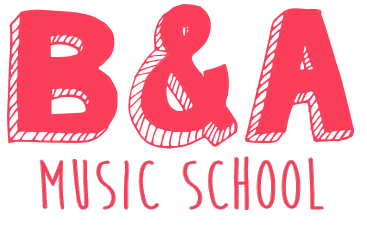![]()
We run sessions and workshops built around the exploration of music, and we encourage people to participate in whatever way they can. We have people whose goals and abilities differ widely. The sessions are extremely flexible, and we will do whatever works for the individual.
We have extensive experience of working alongside people with SEND, PMLD, cerebral palsy, Down’s syndrome, autism, dementia, Parkinson’s, ADHD, hearing and visual impairments, and non-verbal individuals. We work with people of all ages, from pre-school-age children to people in old age.
We can work in schools, colleges, residential/care homes, youth centres, art galleries, museums, festivals, hospitals, and wherever else we’re wanted.
We play music for people
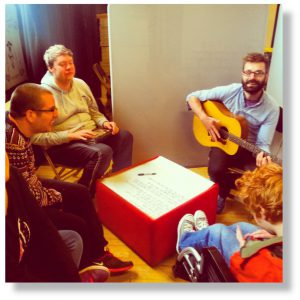
We know not everyone is able to pick up and play a guitar. But we do believe everyone in our sessions can participate in some capacity. Often, just having us play is a rewarding experience in itself. But we try to make the experience as engaging as possible. This can mean something as simple as getting someone to pick a song from our songbook, but it could also include handing out accessible instruments - for people to use however they see fit.
![]()
We make music with people
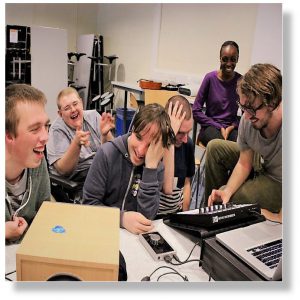
We have a whole host of different instruments, both traditional and accessible, acoustic and electronic, and we encourage everyone to have a go at anything they’re curious about. We will assist in any way required, whether that means teaching people how to play piano, setting someone up with a synth, or helping move someone’s hand across the fingerboard of one of our accessible violins. Sessions could include playing songs or traditional musical instruction. Individual ability is not a factor in whether people can participate. Anyone is welcome and we will make sure everyone plays a part they feel comfortable and satisfied with.
![]()
We help people create their own music
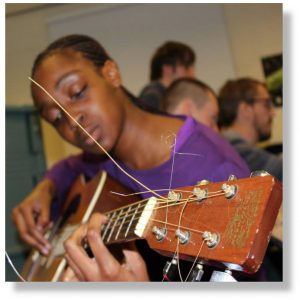
We have people of all abilities and aspirations joining our workshops, and we encourage people to explore their own sound. What this means in practice is different for everyone, and we will help people work towards whatever goals they have. Some will want or need a lot of help, others appreciate autonomy. We adapt to individual needs. But our aim is to get people creatively engaged, and we find working towards a goal is a invaluable tool in that respect. For longer sessions, this will often mean writing and recording songs. It could also mean a live performance. We encourage people to challenge themselves in ways that are appropriate for that individual, and we will offer as much (or little) assistance as is needed.
![]()
We make our own instruments
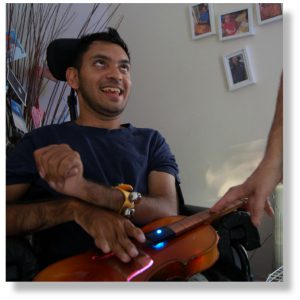
For some people traditional instruments can be less suitable, which is why we use a range of accessible instruments. Sometimes these are traditional instruments that have been adapted, and other times they are something else entirely. But all are designed to meet the specific needs of people with disabilities, and can be used autonomously or with assistance. Anyone is free to give them a try, and they are a great introduction to the world of homemade electronic sound. But as well as using existing accessible instruments, we have also created some of our own. Check out some examples below.
The Tiddle - it’s a fiddle that works by touch!
The Tiddle was born out of two challenges: one set by Drake Music, to design and build an accessible instrument; and the other by us, to take it one step further and create something that could replicate the expressiveness of a traditional instrument. The result was the Tiddle. It works with your body’s own electrical current, which is conducted through copper sheet secured to the violin’s fingerboard and body. You press your finger to the sheet and it makes a sound that varies in pitch as your finger moves, just like a traditional violin – only there are no strings or bow involved.
You can also experiment with dynamics (volume) by varying the pressure applied to the fingerboard. You can create vibrato by shaking the violin. You can explore tone through a library of virtual instruments the Tiddle can connect to. We think it’s best you come and try it for yourself - no strings attached!
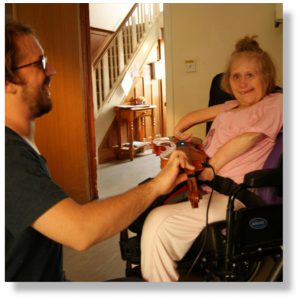
Hacking
By ‘hacking’ we mean manipulating software and hardware to turn everyday objects into musical instruments. We connect things up to a computer with a bank of virtual instruments and use the objects to control the sound. We use joysticks, mice, keyboards, or Rock Band instruments. We’ve also been known to connect up fruit, veg, and event plants! The aim is to give people the ability to create sound with familiar objects which require only touch.
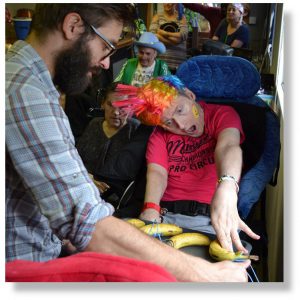
A quick note on the Spotlighters
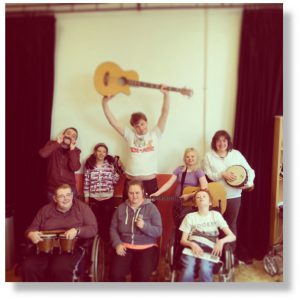
The Spotlighters are a band formed by a number of workshop regulars. We wanted to give them a mention because it’s something we’re particularly proud of. They write their own songs and have played several gigs, including one at Gorse Hill Music Festival, and we predict a Glastonbury headline slot in another couple of years! The band has a core membership but anyone is welcome to join. We pitch in on drums and guitar, and we give direction and assistance as needed when it comes to songwriting. But this is not our band. It belongs to the people at the Music School.
